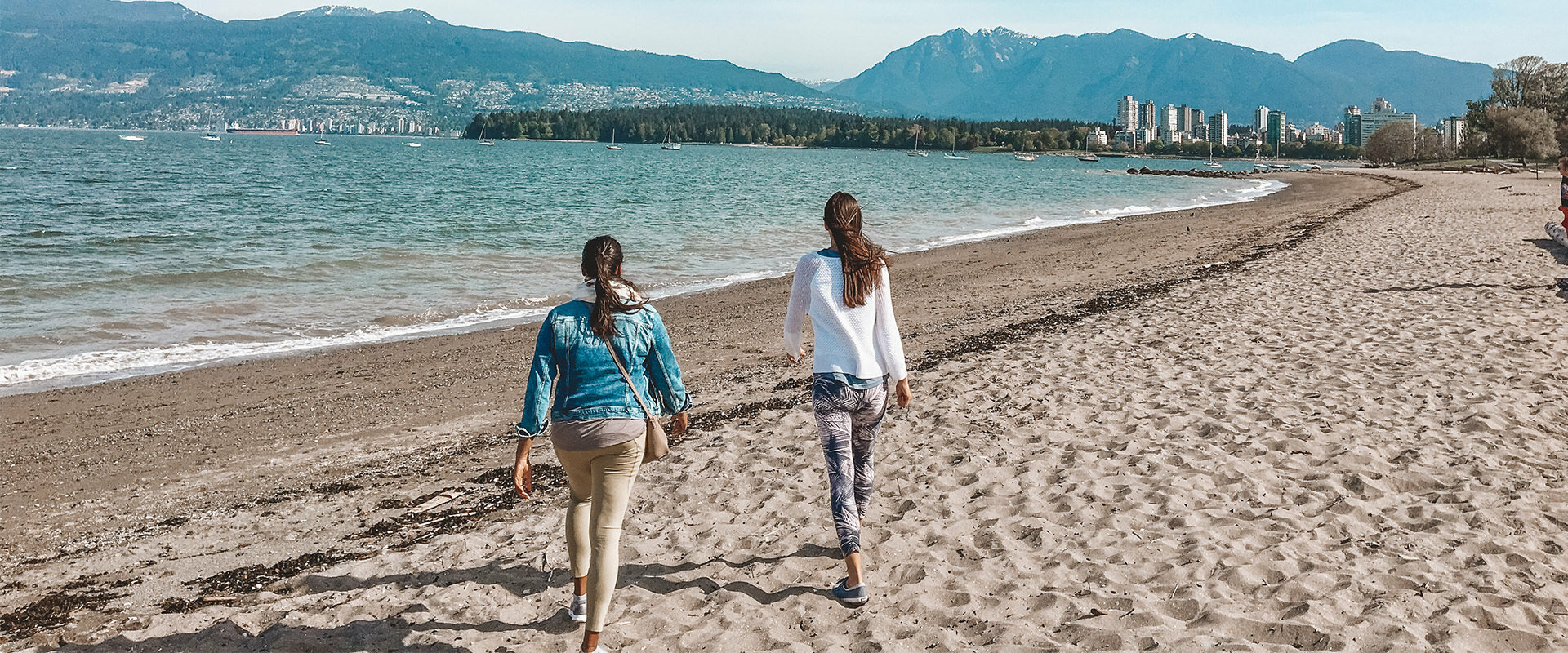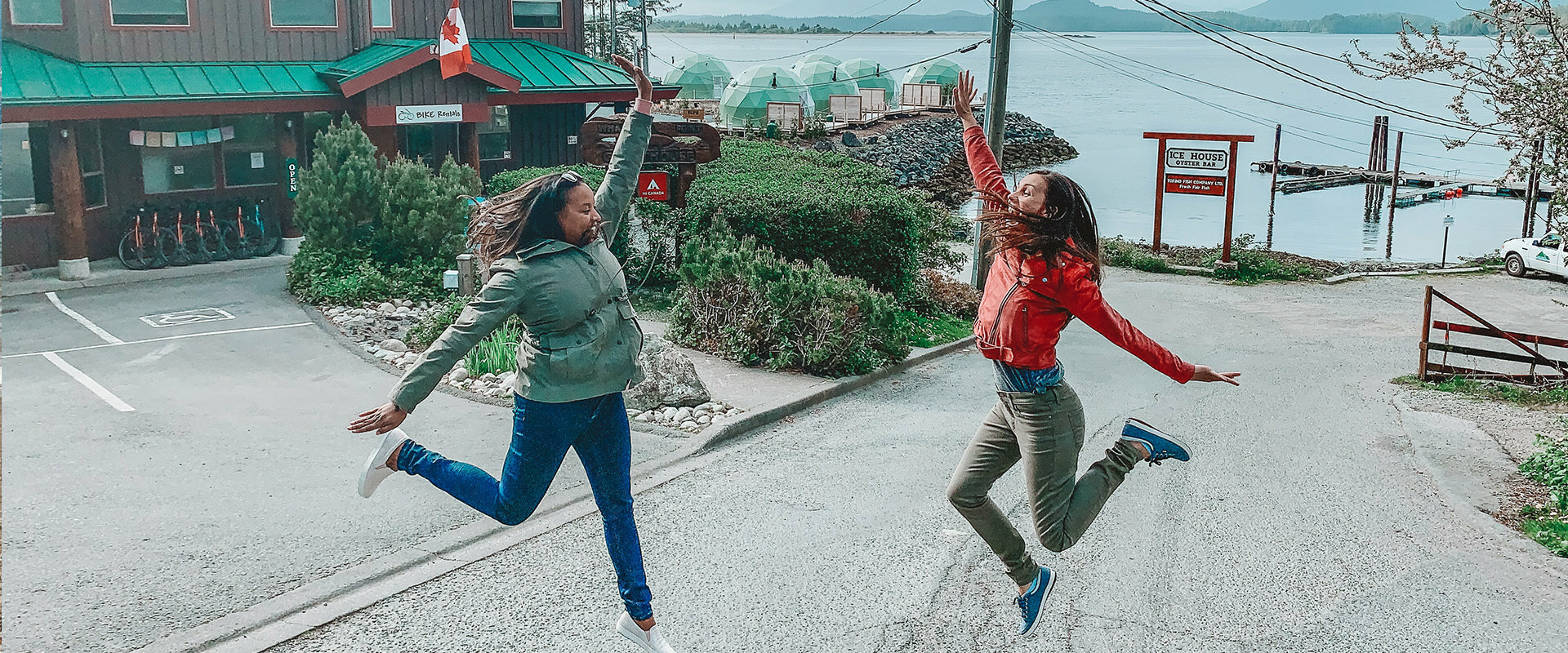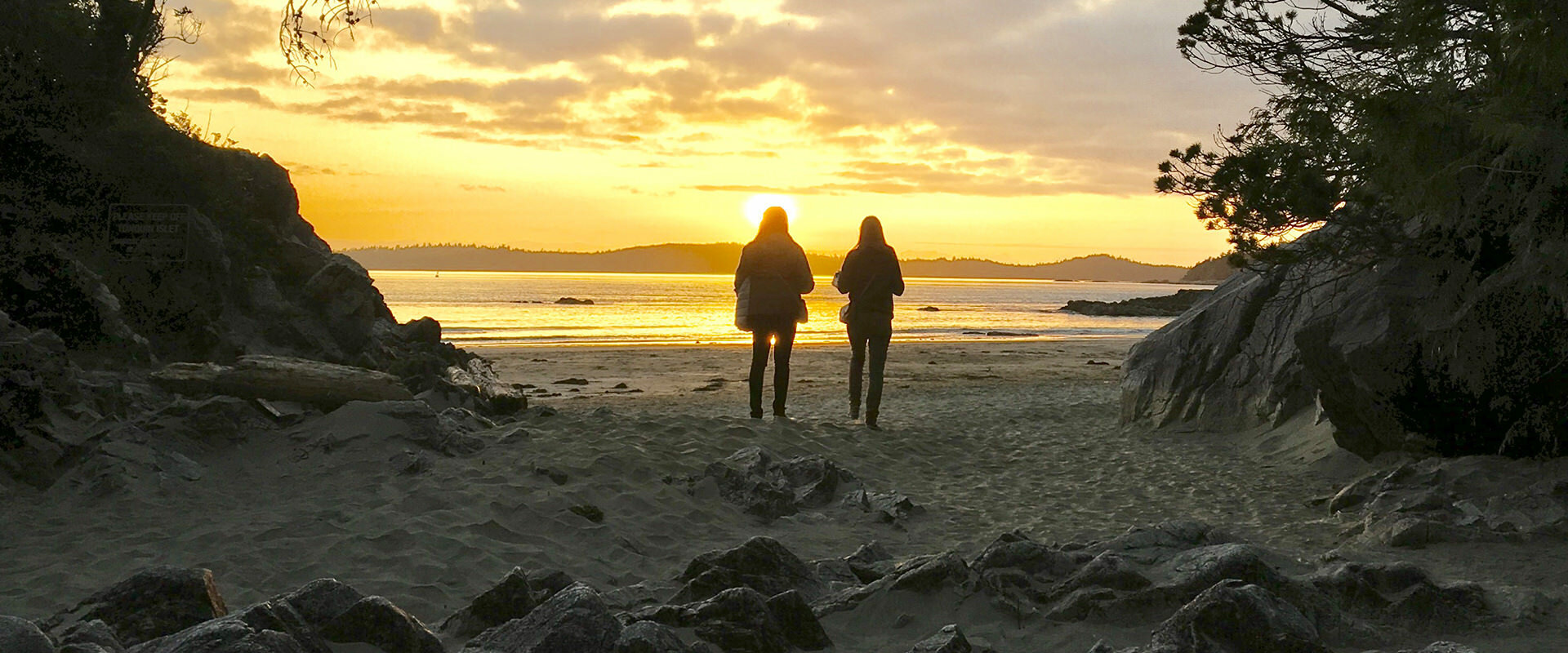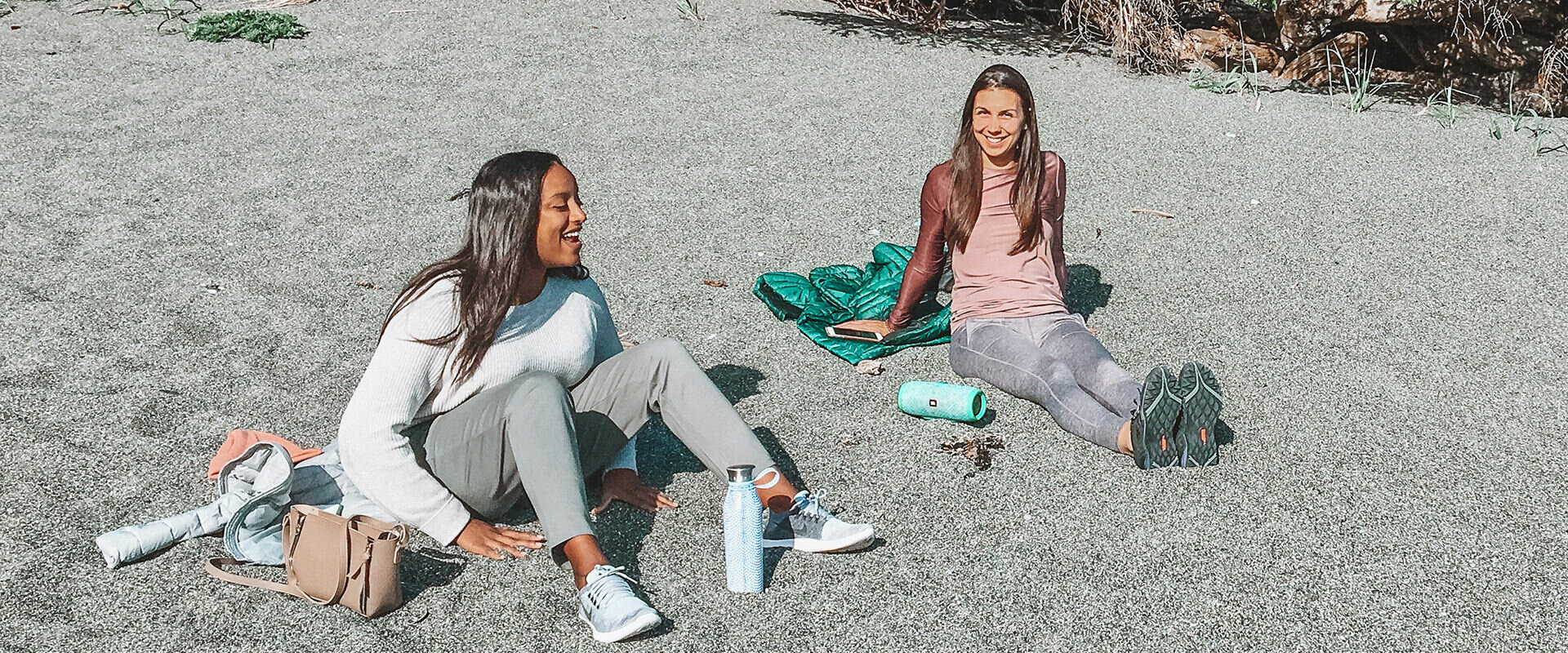Q&A: Travelling Canada with Nomad Junkies
After having explored 65 countries, Safia and Emilie, the founders of the Nomad Junkies blog, decided to explore their own: Canada! After surviving their 60-day road trip they share their best advice.
1. Can you tell us more about how you started Nomad Junkies?
Safia : We launched Nomad Junkies in 2014 after working at an advertising agency for a few years. The two to three weeks of vacation per year just wasn’t enough, and there was a movement in North America of young professionals taking a break from their lives to travel the world. Emilie had already travelled long-term a few times, so we decided to launch our online platform to promote a nomadic lifestyle, which was still a new idea in Quebec. A few weeks later, we were in Ecuador launching Nomad Junkies.
2. We heard you spend most of your time outside Québec. Can you tell us more about your lifestyle?
Safia: When I first left Quebec for Korea, I planned to travel and find jobs abroad, either by teaching English as a second language or through a working holiday visa. I quickly realized that teaching wasn’t something I wanted to do, and luckily, I came across the Cavalia tour while I was in Singapore, so I accepted a permanent position and followed the tour to several Asian countries for almost two years. With the growth of Nomad Junkies, I began adopting a more “digital nomad” lifestyle and decided to devote myself to our business full-time. Now, I look for places around the world where the cost of living is low and there’s a good, stable wifi connection. I visit Quebec a few times a year, but “home” is where my backpack is.
Emilie: In the last five years, we’ve spent about 90 per cent of our time abroad. We love travelling within Quebec and visiting our families, but there are so many wonderful and new places to explore. Now, we’re addicted to the nomadic way of life.

Travelling Canada from coast to coast
3. What surprised you most about travelling across the country? Was there something you didn't expect?
Safia: First of all, Canada is huge and it's a shame we waited so long to explore it. There’s so much to see, do and try! I'm glad we travelled west to east because after the wonder of the Rockies, we knew we had to keep looking for the best of what every province has to offer. I fell in love with the Prairies for their spectacular sunsets and vibrant cities. Travelling across Canada also made me more aware of Indigenous communities and their stories.
Emilie: What surprised me most was how different the landscapes were. I thought all provinces would look like Quebec, but honestly, there was so much variation in scenery and things to do. Activities cost a fraction of what they do in Europe, Australia and New Zealand. You can surf in Tofino, ride horses in the Prairies and go canyoning in Gaspésie. Plus, many exciting activities like spotting bison in Manitoba and icebergs in Newfoundland are free.
4. What was your favorite hostel/city to stay in and why? Was there a special moment or memory you enjoyed there?
Safia: I loved HI Trinity, Skerwink Hostel in Newfoundland. Gavin and Martha are a very welcoming young couple that made us feel at home. They have a deep knowledge of the surrounding area, and they’ll make you want to extend your stay to do all the activities on offer. Newfoundland is definitely a province that deserves to be explored, especially for outdoor enthusiasts. One of my favorites things we did was hunt for icebergs. It was hypnotizing to be in front of those ice giants!
Emilie: My favorite hostel in Canada was the HI Ste-Anne-Des-Monts, Sea Shack. It’s one of the few hostels to have a huge sandy beach, so you can enjoy sunrises and sunsets, and spot whales from the patio. Around the hostel, there are many activities including hiking in Gaspésie National Park and canyoning. Plus, it’s probably the biggest party hostel in Canada thanks to live bands. My other favorite hostels in Canada are HI Tofino, HI Whistler, HI Charlottetown and HI Rossburn.
5. The two of you have travelled to over 60 countries collectively. What's the biggest difference about travelling across Canada compared to other countries?
Safia: Canada reminds us of several places we’ve already visited. The Rockies are reminiscent of the Alps, Newfoundland is a bit like Scandinavia and Winnipeg looks similar to Melbourne. However, one thing that could improve is our transportation network. While public transit works in many cities, access to tourist sites and national parks is greatly limited. You need a car if you want to get out of the big cities and venture off the beaten track.
Emilie: I find that backpacking in Canada is different from other countries because it’s very safe, clean, welcoming and huge! In terms of safety, it’s nice to travel without always having to keep a close eye on your belongings, and it's cool to be able to walk around at night without worry, which is different from many U.S. cities and some countries in Africa and Latin America. Canada is also really clean—even gas station washrooms are carefully cleaned, which is different than in India or many Asian countries. It might sound cliché, but Canadians across the country are extremely friendly and open to visitors. It reminds me of New Zealand, people are so nice. Finally, after driving half of the 12,000 km in 60 days, I realized the vastness of Canada. It’s the second-largest country in the world and when travelling the distance, that becomes obvious.

The best way to travel across Canada
6. What advice would you give other Canadians looking to explore the country? Any tips or tricks when it comes to planning a trip?
Safia: Compared to Asia or Latin America, Canada is an expensive country to visit, but there are many ways to travel on a budget. First of all, stay in hostels and take advantage of discounted activities offered by hostel partners. Cook for yourself in the hostel kitchen and share transportation costs by carpooling. Visit national parks and historic sites that are accessible, and travel during the low season.
Emilie: I visited 65 countries before backpacking mine, and I wish I hadn’t waited as long. To save money, it's important to research the best transportation options whether it's carpooling or renting a car together. Take a gas station chain card and try to fill up at the same brand across the country. Also, limit your restaurant meals by cooking at the hostel, and take an annual Parks Canada entry pass so you can access all the national parks on one ticket.
7. In the time you've been travelling full-time, how have your perspectives on travel and tourism changed?
Safia: The evolution of social media, specifically in the tourism industry, is a topic that’s provoking real debate these days. It seems like many people only travel to capture the next Instagram picture. Some places that once enjoyed relative obscurity are now being ravaged by mass tourism. As a travel influencer, it’s difficult to comment on the issue. We want to share our discoveries with our community, while keeping the unique and mysterious nature of the places we visit.
Emilie: My personal vision of travel has changed a lot. I’m aware of many things like the impact of mass tourism. Before, I enjoyed living in countries where the cost of living was really cheap, but now when I look at places where expatriates settle and take advantage of the cost of living, I wonder, is it modern colonialism? We might live like royalty elsewhere, but locals have a fraction of the quality of life we enjoy. But being a more conscious traveller doesn’t mean seeing only the “bad things,” I also see many beautiful things. Countries considered less "developed" than Western countries have started remarkable initiatives, like the 34 African countries banning and restricting the use of plastics. By travelling, you become aware of many things and end up being exposed to so much diversity.
8. Is there a place in Canada and in the world that you haven't been to yet that's on your must-see list?
Safia: Now that we’ve been to every province, I would love to see the territories. Canada’s north is fascinating and filled with natural wonders just waiting to be discovered. Outside of Canada, I’d love to explore New Zealand, especially since during our travels across Canada, Emilie mentioned several times how much our country reminded her of New Zealand. Also, I have my eye on is Nepal.
Emilie: I would say the Trans-Siberian, Bhutan, West Africa, Scandinavia and Central Asia, off the top of my head. Within Canada, I hope to explore more remote areas like the Yukon, northern Manitoba and Nunavut.

Tips for solo female travellers
9. What is the best advice you've gotten as female travellers? What advice would you give to other women interested in travelling solo?
Safia: Listen to your instinct. If you don’t feel good about it, don’t do it. The vast majority of people we’ve met while travelling have good intentions, but you have to stay alert and set your own limits. If we wouldn’t do it at home, why would you do it during our travel?
Emilie: Travelling alone does not mean feeling lonely! I remember being worried about eating alone in restaurants, but I overcame this fear by bringing a book to read at the restaurant. If I meet someone interesting at the restaurant, I close my book, and if I’m not interested, people understand that I’m inside my bubble.
10. What is the one thing you always pack on trips, especially if it's not something most travellers would think to bring?
Safia: My hair dryer and straightener. They’re the only items I can’t get rid of. When travelling long-term, it's the little things that make a difference.
Emilie: " always bring a sarong, even if there’s no beach, that way, I can wear it as a scarf and it can also be used as a towel after a shower. If I sleep in a dorm on the bottom bed, I hang it to create a partition so I have a little privacy.

Issue 2


